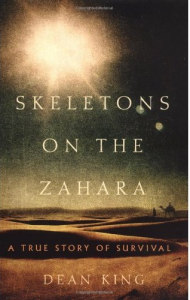 I love maritime history.
I love maritime history.
I love how ships and the sea so heavily influenced — and continue to influence — the world around us.
Maritime non-fiction reading satisfies my craving for a time when men were really men — not softies like most men today, with their smart phones, tablet computers, paper cuts, cubicles, facial lotions and pedicures.
Hence, my latest read: Skeletons on the Zahara: A True Story of Survival, by Dean King.
Summary
It is based on Captain James Riley’s memoir, Sufferings in Africa. It describes how Riley’s U.S. trading brig, the Commerce, out of Connecticut, strayed from its course through the Canary Islands and shipwrecked on the Coast of Northeast Africa in 1815. This led to capture, humiliation and months of slavery on the harsh Sahara Desert. He and his crew were beaten, separated, constantly scabbed and bleeding from exposure, traded several times, nearly starved and often forced to hydrate themselves with their own and camel urine. Riley felt responsible for his crew’s well-being, and especially that of his young cabin boy. His courage and perseverance earned him a fortunate passage north to Morocco, and subsequent ransoming of himself and some of his crew — albeit, their health and psyches were damaged forever. After returning to the U.S., Riley became a passionate abolitionist. Indeed, his memoir was gripping, influential and became an international bestseller.
Comments
Skeletons on the Zahara was well-researched and well-written. King actually retraced the path of Riley and his crew across the Saharan desert. In addition, he cross-referenced Riley’s account with another, lesser-known memoir of a fellow crew member. To the integrity of Riley’s character, the stories and observations proved mostly accurate and consistent. King also filled in some of the gaps with narrative and descriptions of what Riley and others woud likely have have been thinking, doing and saying.
Impact
The tragedy of the Commerce and the suffering of her crew is a gripping story on its own. As a middle-class Caucasion, Skeletons on the Zahara made the horror of slavery come alive in a unique way — especially as the racial tables turned against the white man. I think U.S. students — especially white ones — would benefit from a mandatory reading, to enrich their history studies and cultural context. In fact, President Abraham Lincoln listed Riley’s memoir as among the writings that most influenced his political outlook.
Lastly, Riley’s account is a tremendous case study in leadership. I always admired the story of Sir Earnest Shackleton, who, in 1917, led his crew out of Antartica after his ship crushed in pack ice. Shackleton was a man’s man, a true adventurist, survivalist and leader. I know of college leadership courses and seminars that have put Shackleton on a pedestal, as the finest example of leadership. However, Captain Riley tops Shackleton.
Captain Riley is one my heros.

Deservedly so.